Reflections on Morocco
September, 1994
Daniel S. Weld
 Morocco is a cultural mosaic --- a curious mix of Arab customs, Berber
traditions, and French sophistication. Moroccan cuisine, for example, makes
fresh bread, jam and cafe au lait the standard petit dejeuner, but a dinner
of tagine (an exotic vegetable stew) is always followed by supersweet mint
tea (jokingly called ``Berber Whiskey'' in the strictly Muslim nation).
While driving on the excellent system of (colonially created) roads, one is
as likely to see a nomad herding camels as one is to glimpse elaborately
veiled women at a well or men approaching their mosque.
Morocco is a cultural mosaic --- a curious mix of Arab customs, Berber
traditions, and French sophistication. Moroccan cuisine, for example, makes
fresh bread, jam and cafe au lait the standard petit dejeuner, but a dinner
of tagine (an exotic vegetable stew) is always followed by supersweet mint
tea (jokingly called ``Berber Whiskey'' in the strictly Muslim nation).
While driving on the excellent system of (colonially created) roads, one is
as likely to see a nomad herding camels as one is to glimpse elaborately
veiled women at a well or men approaching their mosque.
We sampled this mosaic in an all-too-brief trip in September `94. After an
expired passport debacle in which we were barred from flight and thus
missed our connection, we flew from Seattle to NYC to London to Tangier to
Casablanca to Marrakech. Two days in this exotic but much touristed city
were enough, so we rented a tiny Renault 4, crossed the high Atlas
mountains, braved a sandstorm in the Sahara, and arrived a week later in
Fez where we spent our final few days. Before our trip, many travelers had
warned us of the numerous hassles --- insistent and unwanted offers from
would-be ``guides'' who wouldn't understand ``No.'' Although we saw a bit
of this in Marrakech, our net experience was a far cry from the warnings
--- people were {\em really} friendly, much more so than in any country I'd
visited before. In almost every town we visited, someone invited us to
their house for dinner or to spend the night. The trip engendered many
wonderful memories, but my favorites stem from walking the labyrinthine
souks of Fez and participating in an incredible Berber wedding.
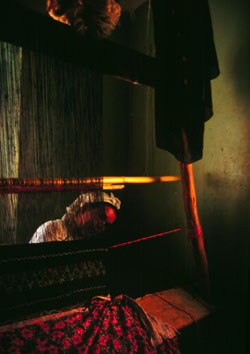 The wedding took place in Ait Oudinar, a small village at the end of the
paved road which follows the Dades river upstream from the rocky desert
flatlands. We'd been crossing the Sahara for three days when we came to the
Dades oasis --- an astonishing ribbon of green fields with almond and
walnut trees shading gardens from the searing sun. Perched high on cliffy
knolls were picturesque {\em kasbahs}, adobe fortresses with thick walls
and slitlike windows; built centuries ago to defend the agricultural wealth
from the raids of camel-bound nomads, many are still occupied today. The
surrounding landscape, rugged slopes of scarlet rubble, provided unreal
contrast to the verdant, irrigated valley floor. The gorge walls were
painted in an astonishing range of colors --- salmon, saffron, carmine, and
vermilion --- but the harsh illumination gave the land a frightening air.
Even Margaret, a diehard sun worshiper, mentioned that some clouds might
be a nice addition to the cobalt sky.
The wedding took place in Ait Oudinar, a small village at the end of the
paved road which follows the Dades river upstream from the rocky desert
flatlands. We'd been crossing the Sahara for three days when we came to the
Dades oasis --- an astonishing ribbon of green fields with almond and
walnut trees shading gardens from the searing sun. Perched high on cliffy
knolls were picturesque {\em kasbahs}, adobe fortresses with thick walls
and slitlike windows; built centuries ago to defend the agricultural wealth
from the raids of camel-bound nomads, many are still occupied today. The
surrounding landscape, rugged slopes of scarlet rubble, provided unreal
contrast to the verdant, irrigated valley floor. The gorge walls were
painted in an astonishing range of colors --- salmon, saffron, carmine, and
vermilion --- but the harsh illumination gave the land a frightening air.
Even Margaret, a diehard sun worshiper, mentioned that some clouds might
be a nice addition to the cobalt sky.
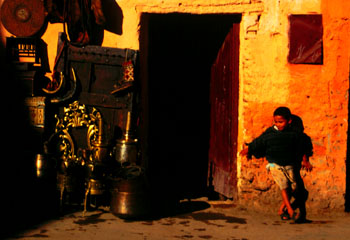 We gave a teenage hitchhiker a lift to his house at the paved road's end,
and liked his happy-go-lucky nature so much that we later asked him to be
our guide for a hike into the hills. As we climbed, the vistas grew ever
more stupendous, but the mountains seemed so bleak, I couldn't imagine
anyone living in them. But our guide Mohammed was right, and we soon came
to the summer camp of a family of Berber nomads. The woman was off tending
the sheep, but the man invited us into their smoke-blackened cave, sat us
down on a fine kilim carpet, boiled some water on a small twig fire, and
served us syrupy sweet mint tea. Meanwhile his young daughter and two small
sons watched us shyly from the deeper recesses of the cave. Mohammed
translated our questions from French to Berber and relayed back the
responses. Every other morning the family gathered water from a distant
spring, using a donkey or camel to transport drums of the precious liquid.
We saw the backstrap loom where goat hair was woven into tent fabric for
their winter accommodation. On Sundays they would take a few sheep or goats
to the village market, far below, and trade fresh meat for sugar,
vegetables, and clothing. It was clearly a hard life, but one which had
been followed for generations.
We gave a teenage hitchhiker a lift to his house at the paved road's end,
and liked his happy-go-lucky nature so much that we later asked him to be
our guide for a hike into the hills. As we climbed, the vistas grew ever
more stupendous, but the mountains seemed so bleak, I couldn't imagine
anyone living in them. But our guide Mohammed was right, and we soon came
to the summer camp of a family of Berber nomads. The woman was off tending
the sheep, but the man invited us into their smoke-blackened cave, sat us
down on a fine kilim carpet, boiled some water on a small twig fire, and
served us syrupy sweet mint tea. Meanwhile his young daughter and two small
sons watched us shyly from the deeper recesses of the cave. Mohammed
translated our questions from French to Berber and relayed back the
responses. Every other morning the family gathered water from a distant
spring, using a donkey or camel to transport drums of the precious liquid.
We saw the backstrap loom where goat hair was woven into tent fabric for
their winter accommodation. On Sundays they would take a few sheep or goats
to the village market, far below, and trade fresh meat for sugar,
vegetables, and clothing. It was clearly a hard life, but one which had
been followed for generations.
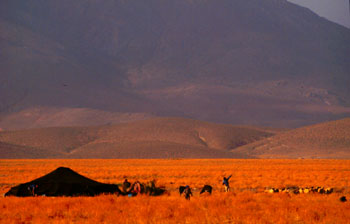 After thanking the nomad for his hospitality, we continued our hike.
Eventually we descended to the Dades river and followed it downstream to a
narrow gorge. Wading through the refreshing water while gazing up at
towering orange walls reminded us of Escalante, Utah. During the walk,
Mohammed had explained that his sister's wedding was that night and invited
us to attend. Berber weddings occupy three (or more in the case of very
rich clans) days of feasting, dancing and celebration; tonight was day two
and the family of the groom was host.
After thanking the nomad for his hospitality, we continued our hike.
Eventually we descended to the Dades river and followed it downstream to a
narrow gorge. Wading through the refreshing water while gazing up at
towering orange walls reminded us of Escalante, Utah. During the walk,
Mohammed had explained that his sister's wedding was that night and invited
us to attend. Berber weddings occupy three (or more in the case of very
rich clans) days of feasting, dancing and celebration; tonight was day two
and the family of the groom was host.
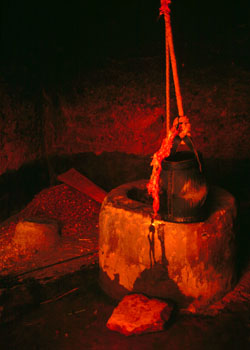 After cleaning up from our hike, we
drove our Renault to Mohammed's parents' house where half the town had
assembled in the street. The women were especially well dressed with
vibrantly colored robes, gaudy amber necklaces, bright yellow scarfs
dangling with beads and small silver squares, hands freshly henna-ed. The
crowd was tense and expectant, chatting excitedly. A group started singing
and drumming. Finally, the door opened and Mohammed's father emerged
followed by his daughter, adorned in bright red, and fully veiled. (While
veils are common in the towns and cities, women rarely wear them in the
more practical, rural areas.) Cheering, the crowd surged for the road.
Mohammed ran for our Renault, we packed seven people (including his
mother!) inside the tiny vehicle, set the hazards flashing in the gathering
dusk, pressed hard on the horn, and eased thru the procession of
wellwishers in an oozing traffic jam that slowly rolled thru the streets
towards a monumental party, which was assembling at the groom's house. Both
lanes of the road teemed with the parade of cars, bikes, donkeys, and
pedestrians. Each truck had a dozen youths clinging to the outside. Under
Mohammed's eager hand, our horn blared a jaunty tune which was adopted by
the other vehicles. Infectious excitement washed the caravan as we churned
slowly towards the groom's house. While we never actually went inside,
later in the evening we were able to watch an hour of dancing from the side
of a jam-packed courtyard which served as the dance floor. A dozen men
lined up facing a similar row of women, and they swayed and turned in time
to drums and a chanting beat. To be honest, the dancing was a bit
anticlimatic after the day's other experiences, but maybe things heated up
later in the program --- it didn't end until 5 am, long after we left.
After cleaning up from our hike, we
drove our Renault to Mohammed's parents' house where half the town had
assembled in the street. The women were especially well dressed with
vibrantly colored robes, gaudy amber necklaces, bright yellow scarfs
dangling with beads and small silver squares, hands freshly henna-ed. The
crowd was tense and expectant, chatting excitedly. A group started singing
and drumming. Finally, the door opened and Mohammed's father emerged
followed by his daughter, adorned in bright red, and fully veiled. (While
veils are common in the towns and cities, women rarely wear them in the
more practical, rural areas.) Cheering, the crowd surged for the road.
Mohammed ran for our Renault, we packed seven people (including his
mother!) inside the tiny vehicle, set the hazards flashing in the gathering
dusk, pressed hard on the horn, and eased thru the procession of
wellwishers in an oozing traffic jam that slowly rolled thru the streets
towards a monumental party, which was assembling at the groom's house. Both
lanes of the road teemed with the parade of cars, bikes, donkeys, and
pedestrians. Each truck had a dozen youths clinging to the outside. Under
Mohammed's eager hand, our horn blared a jaunty tune which was adopted by
the other vehicles. Infectious excitement washed the caravan as we churned
slowly towards the groom's house. While we never actually went inside,
later in the evening we were able to watch an hour of dancing from the side
of a jam-packed courtyard which served as the dance floor. A dozen men
lined up facing a similar row of women, and they swayed and turned in time
to drums and a chanting beat. To be honest, the dancing was a bit
anticlimatic after the day's other experiences, but maybe things heated up
later in the program --- it didn't end until 5 am, long after we left.
 My other incredible memory was the medieval city of Fez, dating from 800
A.D. The buildings were fascinating: gurgling fountains with bright tile
mosaics, ancient green roofed mosques, steamy Moorish baths, exquisite
{\em medersa} (Koranic schools) with finely sculpted plaster ceilings and
elaborate lathed cedar latticework. Encased by huge defensive ramparts, the
old city appears to have swelled up to the walls and then buckled under the
pressure of centuries of vibrant life. The narrow alleys twisted and turned
in bewildering confusion. Crude bamboo mats, hanging from above, blunted
the sun to create a murky dappled shade that accentuates the exotic locale.
My other incredible memory was the medieval city of Fez, dating from 800
A.D. The buildings were fascinating: gurgling fountains with bright tile
mosaics, ancient green roofed mosques, steamy Moorish baths, exquisite
{\em medersa} (Koranic schools) with finely sculpted plaster ceilings and
elaborate lathed cedar latticework. Encased by huge defensive ramparts, the
old city appears to have swelled up to the walls and then buckled under the
pressure of centuries of vibrant life. The narrow alleys twisted and turned
in bewildering confusion. Crude bamboo mats, hanging from above, blunted
the sun to create a murky dappled shade that accentuates the exotic locale.
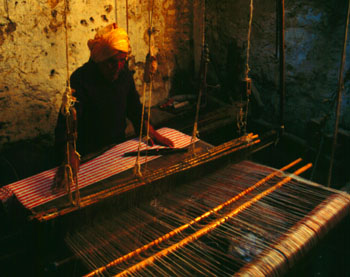 Tiny booths and workshops lined the crowded, winding streets; because of
guilds, each specialty is clustered together. Cobblers, tinsmiths and other
artisans sat on the floor of their small shops, practicing their traditional
methods amid a display of work in progress. Coppersmiths crafted huge, shiny
kettles for village feasts. Jewelers tapped delicate geometric patterns on
silver plates. A pair of burly blacksmiths prodded the glowing charcoal in
their fiery furnace, removed a red hot iron shaft and alternated
hammerblows until it cooled. One could smell the tannery from a distance,
but once inside the courtyard the stench intensified disgustingly. The
whitewashed yard was honeycombed with fetid vats, and stupified workers
stood thigh deep in the filthy pools, hauling the dripping goat hides from
one trough to another. The shadowy looms of the weavers district exuded a
more tranquil atmosphere; the hushed clatter of a wooden shuttle hurling
across the warp scarcely broke the silence. Nearby slipper shops were piled
high with stacks of shoes nested one inside the other; inside, wrinkled men
stitched thick leather soles to supple tops with long needles and tough
fingers. In the dyer's souk, men with soot-blackened faces lifted skeins of
yarn from steaming vats of dye and wrung out the excess pigment before
hoisting the colorful wool to sun dry in a rainbow display.
Tiny booths and workshops lined the crowded, winding streets; because of
guilds, each specialty is clustered together. Cobblers, tinsmiths and other
artisans sat on the floor of their small shops, practicing their traditional
methods amid a display of work in progress. Coppersmiths crafted huge, shiny
kettles for village feasts. Jewelers tapped delicate geometric patterns on
silver plates. A pair of burly blacksmiths prodded the glowing charcoal in
their fiery furnace, removed a red hot iron shaft and alternated
hammerblows until it cooled. One could smell the tannery from a distance,
but once inside the courtyard the stench intensified disgustingly. The
whitewashed yard was honeycombed with fetid vats, and stupified workers
stood thigh deep in the filthy pools, hauling the dripping goat hides from
one trough to another. The shadowy looms of the weavers district exuded a
more tranquil atmosphere; the hushed clatter of a wooden shuttle hurling
across the warp scarcely broke the silence. Nearby slipper shops were piled
high with stacks of shoes nested one inside the other; inside, wrinkled men
stitched thick leather soles to supple tops with long needles and tough
fingers. In the dyer's souk, men with soot-blackened faces lifted skeins of
yarn from steaming vats of dye and wrung out the excess pigment before
hoisting the colorful wool to sun dry in a rainbow display.
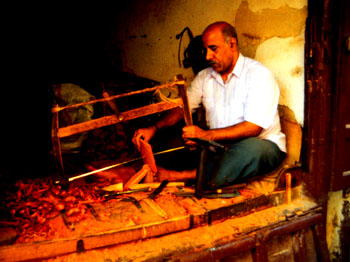 Far from the
lane of cabinet makers, we found a cluster of alcoves where carpenters
crafted spindles, bellows, couscous sifters and other small items. Small
shops sold pottery with elaborate designs glazed in traditional ``Fez blue.''
Other shops held smoothly polished carvings of sandalwood, lemonwood, or
fragrant cedar. Still others displayed silk scarves, brocade and Koranic
quotes embroidered on azure squares of velvet in lush gold thread. One
alley was packed with butchers in white tiled alcoves, illuminated with a
naked incandescent bulb and fenced with hunks of red meat hanging from
hooks. Nearby, country women sold vegetables, squatting by blue tarps piled
high with produce. Some shops specialized in olives --- we counted over a
dozen varieties in one stand. Figs, dates, sweet pastries, nougat and fresh
fruit were plentiful. The aroma of the spice market was intriguing, and the
pharmacist sold dried hedgehogs, live terrapins, mineral shampoo, black
Berber cosmetics, henna, candles and prayer beads.
Far from the
lane of cabinet makers, we found a cluster of alcoves where carpenters
crafted spindles, bellows, couscous sifters and other small items. Small
shops sold pottery with elaborate designs glazed in traditional ``Fez blue.''
Other shops held smoothly polished carvings of sandalwood, lemonwood, or
fragrant cedar. Still others displayed silk scarves, brocade and Koranic
quotes embroidered on azure squares of velvet in lush gold thread. One
alley was packed with butchers in white tiled alcoves, illuminated with a
naked incandescent bulb and fenced with hunks of red meat hanging from
hooks. Nearby, country women sold vegetables, squatting by blue tarps piled
high with produce. Some shops specialized in olives --- we counted over a
dozen varieties in one stand. Figs, dates, sweet pastries, nougat and fresh
fruit were plentiful. The aroma of the spice market was intriguing, and the
pharmacist sold dried hedgehogs, live terrapins, mineral shampoo, black
Berber cosmetics, henna, candles and prayer beads.
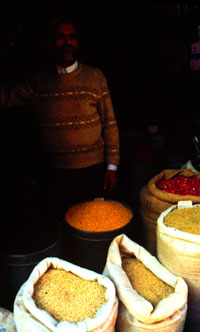 Each night, at dusk, the streets flooded with a tide of people. Crowds
eddied about charcoal braziers sizzling with fresh kabobs and roasted corn.
Veiled women dragged children through alleys surging with crowds and
Margaret and I were separated several times by the unpredictable current.
There seemed only one rule to the roads, and that was the urgent cry
``Balak, balak'' which warned of an approaching donkey, heavily laden
with firewood or perhaps with fresh hides, dripping from the tannery.
It was an important language lesson, and one we learned quickly.
Each night, at dusk, the streets flooded with a tide of people. Crowds
eddied about charcoal braziers sizzling with fresh kabobs and roasted corn.
Veiled women dragged children through alleys surging with crowds and
Margaret and I were separated several times by the unpredictable current.
There seemed only one rule to the roads, and that was the urgent cry
``Balak, balak'' which warned of an approaching donkey, heavily laden
with firewood or perhaps with fresh hides, dripping from the tannery.
It was an important language lesson, and one we learned quickly.
While the overwhelming variety of exotic sights and smells were
fascinating, we came to realize that Fez's true magic was time travel. The
walled city provided a glimpse back to the medieval ages, to an era of
unchanging craftsmanship and simple, practical technologies passed on from
father to son for generations. Alas, our time in Morocco was too short, and
the return journey home was a sad one.
 Morocco is a cultural mosaic --- a curious mix of Arab customs, Berber
traditions, and French sophistication. Moroccan cuisine, for example, makes
fresh bread, jam and cafe au lait the standard petit dejeuner, but a dinner
of tagine (an exotic vegetable stew) is always followed by supersweet mint
tea (jokingly called ``Berber Whiskey'' in the strictly Muslim nation).
While driving on the excellent system of (colonially created) roads, one is
as likely to see a nomad herding camels as one is to glimpse elaborately
veiled women at a well or men approaching their mosque.
Morocco is a cultural mosaic --- a curious mix of Arab customs, Berber
traditions, and French sophistication. Moroccan cuisine, for example, makes
fresh bread, jam and cafe au lait the standard petit dejeuner, but a dinner
of tagine (an exotic vegetable stew) is always followed by supersweet mint
tea (jokingly called ``Berber Whiskey'' in the strictly Muslim nation).
While driving on the excellent system of (colonially created) roads, one is
as likely to see a nomad herding camels as one is to glimpse elaborately
veiled women at a well or men approaching their mosque.
 The wedding took place in Ait Oudinar, a small village at the end of the
paved road which follows the Dades river upstream from the rocky desert
flatlands. We'd been crossing the Sahara for three days when we came to the
Dades oasis --- an astonishing ribbon of green fields with almond and
walnut trees shading gardens from the searing sun. Perched high on cliffy
knolls were picturesque {\em kasbahs}, adobe fortresses with thick walls
and slitlike windows; built centuries ago to defend the agricultural wealth
from the raids of camel-bound nomads, many are still occupied today. The
surrounding landscape, rugged slopes of scarlet rubble, provided unreal
contrast to the verdant, irrigated valley floor. The gorge walls were
painted in an astonishing range of colors --- salmon, saffron, carmine, and
vermilion --- but the harsh illumination gave the land a frightening air.
Even Margaret, a diehard sun worshiper, mentioned that some clouds might
be a nice addition to the cobalt sky.
The wedding took place in Ait Oudinar, a small village at the end of the
paved road which follows the Dades river upstream from the rocky desert
flatlands. We'd been crossing the Sahara for three days when we came to the
Dades oasis --- an astonishing ribbon of green fields with almond and
walnut trees shading gardens from the searing sun. Perched high on cliffy
knolls were picturesque {\em kasbahs}, adobe fortresses with thick walls
and slitlike windows; built centuries ago to defend the agricultural wealth
from the raids of camel-bound nomads, many are still occupied today. The
surrounding landscape, rugged slopes of scarlet rubble, provided unreal
contrast to the verdant, irrigated valley floor. The gorge walls were
painted in an astonishing range of colors --- salmon, saffron, carmine, and
vermilion --- but the harsh illumination gave the land a frightening air.
Even Margaret, a diehard sun worshiper, mentioned that some clouds might
be a nice addition to the cobalt sky.
 We gave a teenage hitchhiker a lift to his house at the paved road's end,
and liked his happy-go-lucky nature so much that we later asked him to be
our guide for a hike into the hills. As we climbed, the vistas grew ever
more stupendous, but the mountains seemed so bleak, I couldn't imagine
anyone living in them. But our guide Mohammed was right, and we soon came
to the summer camp of a family of Berber nomads. The woman was off tending
the sheep, but the man invited us into their smoke-blackened cave, sat us
down on a fine kilim carpet, boiled some water on a small twig fire, and
served us syrupy sweet mint tea. Meanwhile his young daughter and two small
sons watched us shyly from the deeper recesses of the cave. Mohammed
translated our questions from French to Berber and relayed back the
responses. Every other morning the family gathered water from a distant
spring, using a donkey or camel to transport drums of the precious liquid.
We saw the backstrap loom where goat hair was woven into tent fabric for
their winter accommodation. On Sundays they would take a few sheep or goats
to the village market, far below, and trade fresh meat for sugar,
vegetables, and clothing. It was clearly a hard life, but one which had
been followed for generations.
We gave a teenage hitchhiker a lift to his house at the paved road's end,
and liked his happy-go-lucky nature so much that we later asked him to be
our guide for a hike into the hills. As we climbed, the vistas grew ever
more stupendous, but the mountains seemed so bleak, I couldn't imagine
anyone living in them. But our guide Mohammed was right, and we soon came
to the summer camp of a family of Berber nomads. The woman was off tending
the sheep, but the man invited us into their smoke-blackened cave, sat us
down on a fine kilim carpet, boiled some water on a small twig fire, and
served us syrupy sweet mint tea. Meanwhile his young daughter and two small
sons watched us shyly from the deeper recesses of the cave. Mohammed
translated our questions from French to Berber and relayed back the
responses. Every other morning the family gathered water from a distant
spring, using a donkey or camel to transport drums of the precious liquid.
We saw the backstrap loom where goat hair was woven into tent fabric for
their winter accommodation. On Sundays they would take a few sheep or goats
to the village market, far below, and trade fresh meat for sugar,
vegetables, and clothing. It was clearly a hard life, but one which had
been followed for generations.
 After thanking the nomad for his hospitality, we continued our hike.
Eventually we descended to the Dades river and followed it downstream to a
narrow gorge. Wading through the refreshing water while gazing up at
towering orange walls reminded us of Escalante, Utah. During the walk,
Mohammed had explained that his sister's wedding was that night and invited
us to attend. Berber weddings occupy three (or more in the case of very
rich clans) days of feasting, dancing and celebration; tonight was day two
and the family of the groom was host.
After thanking the nomad for his hospitality, we continued our hike.
Eventually we descended to the Dades river and followed it downstream to a
narrow gorge. Wading through the refreshing water while gazing up at
towering orange walls reminded us of Escalante, Utah. During the walk,
Mohammed had explained that his sister's wedding was that night and invited
us to attend. Berber weddings occupy three (or more in the case of very
rich clans) days of feasting, dancing and celebration; tonight was day two
and the family of the groom was host.
 After cleaning up from our hike, we
drove our Renault to Mohammed's parents' house where half the town had
assembled in the street. The women were especially well dressed with
vibrantly colored robes, gaudy amber necklaces, bright yellow scarfs
dangling with beads and small silver squares, hands freshly henna-ed. The
crowd was tense and expectant, chatting excitedly. A group started singing
and drumming. Finally, the door opened and Mohammed's father emerged
followed by his daughter, adorned in bright red, and fully veiled. (While
veils are common in the towns and cities, women rarely wear them in the
more practical, rural areas.) Cheering, the crowd surged for the road.
Mohammed ran for our Renault, we packed seven people (including his
mother!) inside the tiny vehicle, set the hazards flashing in the gathering
dusk, pressed hard on the horn, and eased thru the procession of
wellwishers in an oozing traffic jam that slowly rolled thru the streets
towards a monumental party, which was assembling at the groom's house. Both
lanes of the road teemed with the parade of cars, bikes, donkeys, and
pedestrians. Each truck had a dozen youths clinging to the outside. Under
Mohammed's eager hand, our horn blared a jaunty tune which was adopted by
the other vehicles. Infectious excitement washed the caravan as we churned
slowly towards the groom's house. While we never actually went inside,
later in the evening we were able to watch an hour of dancing from the side
of a jam-packed courtyard which served as the dance floor. A dozen men
lined up facing a similar row of women, and they swayed and turned in time
to drums and a chanting beat. To be honest, the dancing was a bit
anticlimatic after the day's other experiences, but maybe things heated up
later in the program --- it didn't end until 5 am, long after we left.
After cleaning up from our hike, we
drove our Renault to Mohammed's parents' house where half the town had
assembled in the street. The women were especially well dressed with
vibrantly colored robes, gaudy amber necklaces, bright yellow scarfs
dangling with beads and small silver squares, hands freshly henna-ed. The
crowd was tense and expectant, chatting excitedly. A group started singing
and drumming. Finally, the door opened and Mohammed's father emerged
followed by his daughter, adorned in bright red, and fully veiled. (While
veils are common in the towns and cities, women rarely wear them in the
more practical, rural areas.) Cheering, the crowd surged for the road.
Mohammed ran for our Renault, we packed seven people (including his
mother!) inside the tiny vehicle, set the hazards flashing in the gathering
dusk, pressed hard on the horn, and eased thru the procession of
wellwishers in an oozing traffic jam that slowly rolled thru the streets
towards a monumental party, which was assembling at the groom's house. Both
lanes of the road teemed with the parade of cars, bikes, donkeys, and
pedestrians. Each truck had a dozen youths clinging to the outside. Under
Mohammed's eager hand, our horn blared a jaunty tune which was adopted by
the other vehicles. Infectious excitement washed the caravan as we churned
slowly towards the groom's house. While we never actually went inside,
later in the evening we were able to watch an hour of dancing from the side
of a jam-packed courtyard which served as the dance floor. A dozen men
lined up facing a similar row of women, and they swayed and turned in time
to drums and a chanting beat. To be honest, the dancing was a bit
anticlimatic after the day's other experiences, but maybe things heated up
later in the program --- it didn't end until 5 am, long after we left.
 My other incredible memory was the medieval city of Fez, dating from 800
A.D. The buildings were fascinating: gurgling fountains with bright tile
mosaics, ancient green roofed mosques, steamy Moorish baths, exquisite
{\em medersa} (Koranic schools) with finely sculpted plaster ceilings and
elaborate lathed cedar latticework. Encased by huge defensive ramparts, the
old city appears to have swelled up to the walls and then buckled under the
pressure of centuries of vibrant life. The narrow alleys twisted and turned
in bewildering confusion. Crude bamboo mats, hanging from above, blunted
the sun to create a murky dappled shade that accentuates the exotic locale.
My other incredible memory was the medieval city of Fez, dating from 800
A.D. The buildings were fascinating: gurgling fountains with bright tile
mosaics, ancient green roofed mosques, steamy Moorish baths, exquisite
{\em medersa} (Koranic schools) with finely sculpted plaster ceilings and
elaborate lathed cedar latticework. Encased by huge defensive ramparts, the
old city appears to have swelled up to the walls and then buckled under the
pressure of centuries of vibrant life. The narrow alleys twisted and turned
in bewildering confusion. Crude bamboo mats, hanging from above, blunted
the sun to create a murky dappled shade that accentuates the exotic locale.
 Tiny booths and workshops lined the crowded, winding streets; because of
guilds, each specialty is clustered together. Cobblers, tinsmiths and other
artisans sat on the floor of their small shops, practicing their traditional
methods amid a display of work in progress. Coppersmiths crafted huge, shiny
kettles for village feasts. Jewelers tapped delicate geometric patterns on
silver plates. A pair of burly blacksmiths prodded the glowing charcoal in
their fiery furnace, removed a red hot iron shaft and alternated
hammerblows until it cooled. One could smell the tannery from a distance,
but once inside the courtyard the stench intensified disgustingly. The
whitewashed yard was honeycombed with fetid vats, and stupified workers
stood thigh deep in the filthy pools, hauling the dripping goat hides from
one trough to another. The shadowy looms of the weavers district exuded a
more tranquil atmosphere; the hushed clatter of a wooden shuttle hurling
across the warp scarcely broke the silence. Nearby slipper shops were piled
high with stacks of shoes nested one inside the other; inside, wrinkled men
stitched thick leather soles to supple tops with long needles and tough
fingers. In the dyer's souk, men with soot-blackened faces lifted skeins of
yarn from steaming vats of dye and wrung out the excess pigment before
hoisting the colorful wool to sun dry in a rainbow display.
Tiny booths and workshops lined the crowded, winding streets; because of
guilds, each specialty is clustered together. Cobblers, tinsmiths and other
artisans sat on the floor of their small shops, practicing their traditional
methods amid a display of work in progress. Coppersmiths crafted huge, shiny
kettles for village feasts. Jewelers tapped delicate geometric patterns on
silver plates. A pair of burly blacksmiths prodded the glowing charcoal in
their fiery furnace, removed a red hot iron shaft and alternated
hammerblows until it cooled. One could smell the tannery from a distance,
but once inside the courtyard the stench intensified disgustingly. The
whitewashed yard was honeycombed with fetid vats, and stupified workers
stood thigh deep in the filthy pools, hauling the dripping goat hides from
one trough to another. The shadowy looms of the weavers district exuded a
more tranquil atmosphere; the hushed clatter of a wooden shuttle hurling
across the warp scarcely broke the silence. Nearby slipper shops were piled
high with stacks of shoes nested one inside the other; inside, wrinkled men
stitched thick leather soles to supple tops with long needles and tough
fingers. In the dyer's souk, men with soot-blackened faces lifted skeins of
yarn from steaming vats of dye and wrung out the excess pigment before
hoisting the colorful wool to sun dry in a rainbow display.
 Far from the
lane of cabinet makers, we found a cluster of alcoves where carpenters
crafted spindles, bellows, couscous sifters and other small items. Small
shops sold pottery with elaborate designs glazed in traditional ``Fez blue.''
Other shops held smoothly polished carvings of sandalwood, lemonwood, or
fragrant cedar. Still others displayed silk scarves, brocade and Koranic
quotes embroidered on azure squares of velvet in lush gold thread. One
alley was packed with butchers in white tiled alcoves, illuminated with a
naked incandescent bulb and fenced with hunks of red meat hanging from
hooks. Nearby, country women sold vegetables, squatting by blue tarps piled
high with produce. Some shops specialized in olives --- we counted over a
dozen varieties in one stand. Figs, dates, sweet pastries, nougat and fresh
fruit were plentiful. The aroma of the spice market was intriguing, and the
pharmacist sold dried hedgehogs, live terrapins, mineral shampoo, black
Berber cosmetics, henna, candles and prayer beads.
Far from the
lane of cabinet makers, we found a cluster of alcoves where carpenters
crafted spindles, bellows, couscous sifters and other small items. Small
shops sold pottery with elaborate designs glazed in traditional ``Fez blue.''
Other shops held smoothly polished carvings of sandalwood, lemonwood, or
fragrant cedar. Still others displayed silk scarves, brocade and Koranic
quotes embroidered on azure squares of velvet in lush gold thread. One
alley was packed with butchers in white tiled alcoves, illuminated with a
naked incandescent bulb and fenced with hunks of red meat hanging from
hooks. Nearby, country women sold vegetables, squatting by blue tarps piled
high with produce. Some shops specialized in olives --- we counted over a
dozen varieties in one stand. Figs, dates, sweet pastries, nougat and fresh
fruit were plentiful. The aroma of the spice market was intriguing, and the
pharmacist sold dried hedgehogs, live terrapins, mineral shampoo, black
Berber cosmetics, henna, candles and prayer beads.
 Each night, at dusk, the streets flooded with a tide of people. Crowds
eddied about charcoal braziers sizzling with fresh kabobs and roasted corn.
Veiled women dragged children through alleys surging with crowds and
Margaret and I were separated several times by the unpredictable current.
There seemed only one rule to the roads, and that was the urgent cry
``Balak, balak'' which warned of an approaching donkey, heavily laden
with firewood or perhaps with fresh hides, dripping from the tannery.
It was an important language lesson, and one we learned quickly.
Each night, at dusk, the streets flooded with a tide of people. Crowds
eddied about charcoal braziers sizzling with fresh kabobs and roasted corn.
Veiled women dragged children through alleys surging with crowds and
Margaret and I were separated several times by the unpredictable current.
There seemed only one rule to the roads, and that was the urgent cry
``Balak, balak'' which warned of an approaching donkey, heavily laden
with firewood or perhaps with fresh hides, dripping from the tannery.
It was an important language lesson, and one we learned quickly.